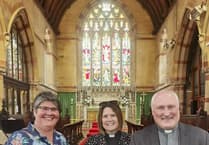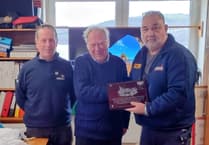An emeritus professor of international history and intelligence studies at Aberystwyth University has written a book about the Cuban Missile Crisis.
The Cuban Missile Crisis: To Armageddon and Beyond is a new title from Pen & Sword, written by Len Scott who taught at Aberystwyth for 25 years.
It is now over 60 years since the events of October 1962 brought the world close to nuclear catastrophe.
The Cuban Missile Crisis has long been recognised as the moment of greatest danger in the life (and near death) of humanity.
In those 60 years, our knowledge and understanding of events have undergone significant change.
There are some reasons to be encouraged, inasmuch as we have learned how both President John F Kennedy and Premier Nikita Khrushchev sought to avoid nuclear war.
More ominously, we have learned of incidents and events that suggest nuclear weapons might have been used by subordinate military commanders, in circumstances frequently unknown to their political leaders.
Decisions whether to use nuclear weapons lay in the hands of often junior military commanders, some of whom were perilously close to crossing the nuclear threshold.
This does not mean – as often assumed – that if some nuclear weapons were used, escalation to all-out war was inevitable.
Yet the undoubted risk of thermonuclear war in these circumstances threatened the very survival of civilisation.
Hundreds, if not thousands, of millions of people would have died from immediate and short-term effects, while the longer-term prospect of a ‘Nuclear Winter’ portended the virtual extinction of humanity.
Drawing lessons from 60 years ago faces significant challenges. If we draw lessons only to discover our understanding was mistaken, we might well have drawn the wrong lessons.
Many received wisdoms about the crisis have been shown to be misleading.
What is striking is how after 40 or 50 or even 60 years, new evidence has emerged to challenge previously accepted explanations.
It is for the reader to reach their own verdicts on the history of the crisis, and how much we owe to political leaders who averted catastrophe (as well as how their words and deeds helped create the crisis in the first place).
It is for the reader to conclude how close we came to nuclear war. Whatever conclusions are reached, one overriding lesson looms large.
However we judge the actions of political and military leaders, one factor was crucial in why we avoided nuclear war in 1962. It was luck.
In October 1962, humanity was very lucky. Will we be so lucky next time?
Ken Booth FBA, distinguished research professor at Aberystwyth University said: “This book is an outstanding contribution to the ever-growing literature on the truly historic set of events making up the Cuban Missile Crisis.
“While experts on the crisis will be familiar with many of the issues confronted, they will discover probably the best-written account of them, will surely learn something new, and be asked to question what they had come to think was settled.”
Professor Scott was director of the Centre for Intelligence and International Security Studies (CIISS) at Aberystwyth University. He also served as Dean of the Social Science Faculty for 10 years.
During the 1980s, he worked as political adviser to shadow foreign secretary Denis Healey and then as a civil servant in the Treasury.
Professor Scott has published extensively on Cold War history, nuclear weapons, and secret intelligence.




